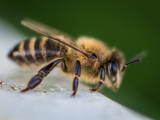Inspiration from Mother Nature for cancer therapy
Dr. Pan's research explores bee venom
Discovery Magazine interviewed Dr. Dipanjan Pan about lab's research on venom as a possible cancer therapy.
Excerpt from All the Buzz About Bee Venom (and More)
"A pioneering breakthrough may come from chemist and bioengineer Dipanjan Pan, who is currently looking into a melittin-based cancer therapy with his lab at the University of Maryland, Baltimore County and University of Maryland School of Medicine.
Amid calls for safer, more successful cancer treatments, Pan inspected toad, scorpion and bee venom for answers. “The philosophy of my research is biomimetics, or bringing inspiration from Mother Nature,” he says.
These animal poisons include toxins like melittin, which is considered a host defense peptide. Most multicellular organisms have these peptides to ward off disease, including humans, but only some creatures weaponize them in the form of powerful venom. Funnily enough, this toxin could end up saving human lives.
And it isn’t particularly difficult to create synthetic melittin in a lab, Pan says, which is optimal for drug development due to its convenience, quality control, and relative safety compared to crude natural sources.
The real challenge: designing an effective delivery method that squashes cancer growth but leaves surrounding cells healthy. Chemotherapy, for example, commonly causes patients to lose their hair because it damages follicles in the process. “That has been the key bottleneck in targeted [cancer] therapy,” he adds. “It boils down to: How can we make these venom peptides more selective and targeted to the cancer cell? It’s like finding a needle in a haystack.”
Photo credit: David Hablützel from Pexels
Posted: September 20, 2021, 1:16 PM
